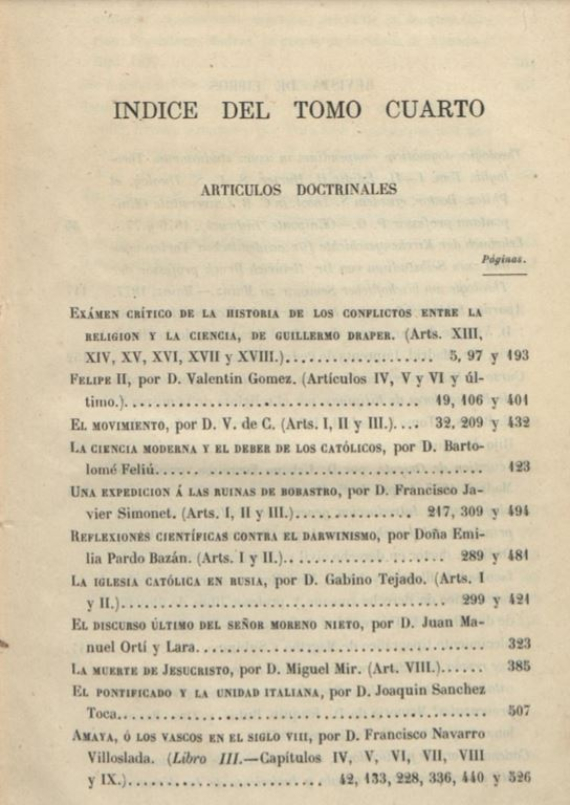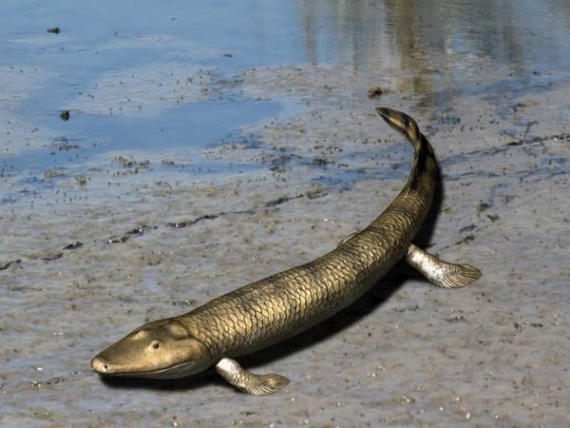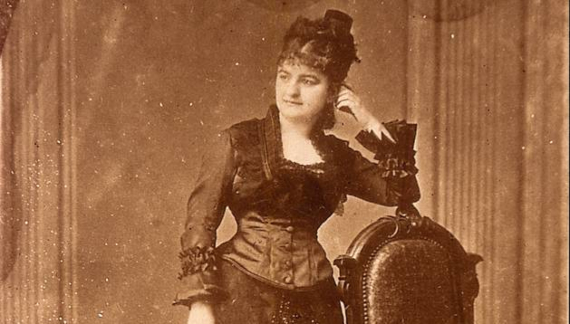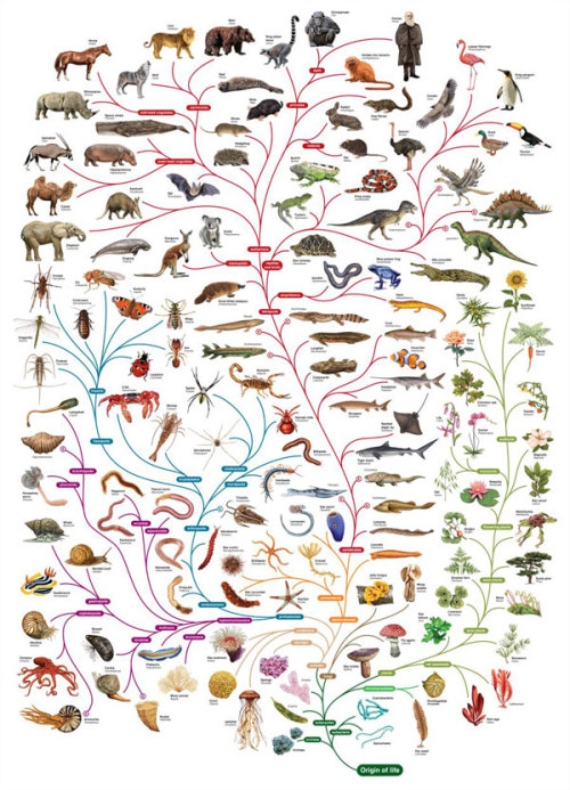The publication of two of Darwin’s most influential works – On the Origin of Species in 1859 and The Descent of Man in 1871 – caused a tremendous impact on different spheres of society, stirring many reactions, earning an abundance of both praise and criticism. In particular, it spurred huge contrarian movements in Christian religious circles. In Spain, one of the most prominent and explicit reactions in this field was that of a very young writer, Emilia Pardo Bazán (September 16, 1851 – May 12, 1921), who in 1877 penned a multi-part essay entitled “Scientific Reflections Against Darwinism” in “La Ciencia Cristiana,” a Christian science journal1.

Source: Hemeroteca digital BNE
As Spain commemorates the 100th anniversary of the death of the great Galician writer, we take the opportunity to take a close look at her objections to Darwinism and, above all, the responses that, since then, emerged to dispel the criticism laid by “Christian Darwinism,” a movement of which Pardo Bazán stands as a paradigmatic figure.
THE OBJECTIONS VOICED BY PARDO BAZÁN
Our author criticized a number of specific aspects of Darwin’s evolutionary theories: natural selection, variations among populations and their descent, atavism, etc. But her main criticisms focused on some of the general and core aspects of Darwinism such as the origin of species and humanity.
Pardo Bazán’s first and main disagreement was that Darwin’s theory about species originating from a few common ancestors is not really a scientific theory but a “novel.” According to her and her main “scientific” mentor – Father Secchi of the Vatican Observatory – this theory lacked enough confirming “evidences”. Therefore, the advice she gave to believers was not to take it seriously, and that they could rest assured in their Christian faith about the origin of species by the action of God, who created them separately of each other when he created Earth.
And regarding mankind’s origins, Pardo Bazán avoided echoing one of the most frequent misconceptions spread by religious anti-Darwinists, especially back then, which is that in his second seminal work, Darwin stated that “humans evolved from monkeys.” But against the idea that Darwin did set forth – i.e. that humans share recent common ancestors with the great apes (chimpanzees, gorillas, orangutans …) – the young Galician writer once again argued that it was not acceptable due to the lack of evidence – i.e. intermediate forms between monkeys and humans – confirming this idea. Indeed, she pointed out the absence of signs of “beastliness” in the oldest known fossil bones discovered at the time, which belonged to Neanderthals.
THE RESPONSE OF DARWINISM
It is true that back when Pardo Bazán wrote her text there wasn’t a huge body of much paleontological evidence confirming the different stages of evolutionary processes, including those of the human species itself. But Darwin’s theories were also based on many very convincing arguments, including anatomical, bio-geographical, developmental, etc.
Since then, on top of all these indications and the new findings in fields such as Genetics, thousands of fossils have been discovered, demonstrating the reality of evolutionary processes. Thus, the unearthing of fossils such as those of the Tiktaalik, with its mélange of both fish and amphibian characteristics, have yielded anatomical clues on how vertebrates transitioned from water to land. And fossils such as Australopithecus in general, or “Lucy” in particular, have shed light on the early stages of evolution of our genus Homo.

Likewise, thanks to Molecular Biology, it has been proven that all living organisms have a single common ancestor, because they are all based on the same system of storage and expression of genetic information that enables them to “assemble” themselves; being said information closer or farther apart depending on whether the evolutionary processes that spawned them are more proximal or distant in time.
TWO CONFLICTING ISSUES: RACE AND WOMEN
n The Descent of Man, Darwin postulated that all “races” that classified as human at the time shared a common ancestor. In this he differed from other authors, some of whom even argued that some races – those of the “uncivilized” world – belonged to a different species than the “civilized” world. Darwin was – obviously – right when he stated that all humans originated from Africa, as it was here that most of our “close relatives” lived.
But he also postulated that Indo-European “races” were superior to the others because of a special selection process that had acted on them: sexual selection, which he introduced in this work. According to this theory, Indo-European “races” had undergone a process of competition for mating that had caused them to “improve” compared to other “races”. Darwin also concluded that since women had not been subject to this selective process, they were “biologically” inferior to men.
Pardo Bazán was an advocate of equality of all human beings and therefore opposed these “racist” and “sexist” ideas. First, in her essay, she concurred with Darwin’s idea that all races belonged to the same species. But she was more ambivalent about the alleged superiority of some races. In several instances she claimed that all races are equal before God. In other instances, she spoke about the superiority of the Indo-European race, and even went as far as to vilify the Jewish “race” on several occasions.
In her essay she did not address the topic of women. It is not hard to understand why: She was very young when she published it – she had just turned 25– and the journal where it came out was renowned for its Christian fervor and anti-feminist stance, her family was very conservative…. However, as she and her work later evolved during her lifetime, she became a staunch advocate of the “biological” equality of women and men. She said, for example, that it is not nature, but society which tips the balance in favor of men. And even later on, her incomplete acceptance of Darwinism – she declared herself a “Christian naturalist” – was largely motivated by her disagreement with Darwin’s “male-centric” idea.

Darwin’s ideas about race and women have since been proven wrong due to a lack of biological basis. In fact, his concept of race applied to the human species is deemed obsolete. Today, as the world commemorates the 150th anniversary of the publication of The Descent of Man, it is worth noting that for all the brilliance and accuracy of many of its findings, the race and gender theories it proposed, owed more to the views that prevailed in Victorian times than to the biological basis, which it lacked.
Conclusion
All things considered, it is probably fair to say that in her early years as a writer, Pardo Bazán was very much against Darwinism. However, later in her complex life and work, she adhered to movements such as naturalism or positivism, whose postulates were in line with many of the principles of Darwinism. In fact, in some of her writings nature plays a key role, influencing her characters, and the need to adapt to the “environment” is clear. And furthermore, while some of her works ridicule characters that replicate Darwinian ideas, others treat them more benevolently. But if there is one thing that stands out the most is how she somehow took a stance against some of Darwin’s most controversial ideas, such as the superiority of some “human races” compared to others, and, especially, the inferiority of women, although this happened time after the publication of the essay cited at the beginning.

Ultimately, since Pardo Bazán, mounting scientific evidence and discoveries regarding the evolutionary process coming from fields such as Paleontology or Genetics, “forced” defenders of Christian anti-Darwinism to accept Darwin’s evolutionary theory. To the point that in 1996 Pope John Paul II admitted that the theory of evolution “is more than a hypothesis.”
Manuel Ruiz Rejón
Professor of Genetics at the Universities of Granada and Autónoma de Madrid
BIBLIOGRAPHY
- Several books have been published in Spanish focusing on Darwin’s two books. On Darwin online it is possible to find the originals in English and their first translations into Spanish. Pardo Bazán’s essay “Scientific Reflections against Darwinism” in La Ciencia Cristiana, 1877-Vols IV and V is available for consultation on the Virtual Library of the National Library of Spain.
- De Silva, J. (ed.) 2021. A Most Interesting Problem: What Darwin’s Descent of Man Got Right and Wrong about Human Evolution. Princeton University Press.
Comments on this publication